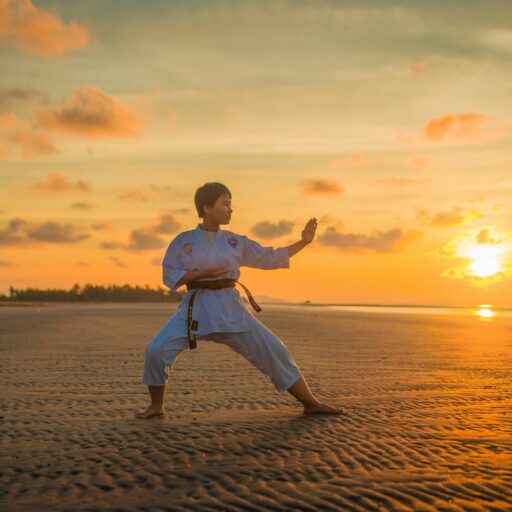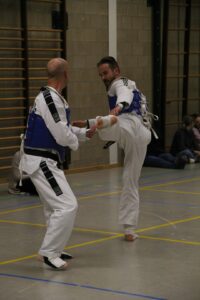Support our educational content for free when you purchase through links on our site. Learn more
[2023] What is a Karate Practitioner Called?
Karate, the ancient martial art form originating from Okinawa, Japan, has gained immense popularity worldwide. As you delve deeper into the world of Karate, you might wonder, "What is a karate practitioner called?" In this comprehensive guide, our team at Karate MMA™ will provide you with the quick answer, explore the etymology and history of the term, discuss the practice and philosophy of Karate, highlight different styles, and delve into its representation in the world and popular culture. So, let's kick things off!
Table of Contents
- Quick Answer
- Quick Tips and Facts
- Etymology
- History
- Practice
- Philosophy
- Styles
- World
- In Film and Popular Culture
- FAQ
- Conclusion
- Recommended Links
- Reference Links
Quick Answer
A karate practitioner is commonly referred to as a karateka. The term "karateka" is derived from the Japanese words "karate" (empty hand) and "ka" (person). It is used to describe individuals who practice and study the art of Karate.
Quick Tips and Facts
- The term "karateka" is used to refer to both male and female practitioners of Karate.
- Karateka devote themselves to the study and mastery of various techniques, forms, and philosophies associated with Karate.
- The title of "karateka" is earned through dedication, training, and progression in the art form.
- Karateka often wear a traditional white uniform called a "gi" during training and competitions.
Etymology
The term "karateka" is a combination of two Japanese words. "Karate" translates to "empty hand" in English, while "ka" means "person" or "practitioner." When combined, they form the word "karateka," which signifies an individual who practices Karate. The term accurately reflects the essence of the art form, which emphasizes self-defense techniques without the use of weapons.
History
The history of Karate dates back centuries and is deeply rooted in Okinawan and Chinese martial arts traditions. It evolved from the indigenous fighting methods of the Ryukyu Kingdom (present-day Okinawa) and was heavily influenced by Chinese martial arts brought to Okinawa by Chinese immigrants.
Karate gained significant recognition in the early 20th century when it was introduced to mainland Japan. The art form underwent further development and refinement, incorporating elements from various martial arts styles. Today, Karate is practiced and revered worldwide.
Practice
Karate is not just a physical activity; it is a way of life. The practice of Karate involves a holistic approach that encompasses physical training, mental discipline, and spiritual growth. Karateka engage in rigorous training sessions to develop strength, flexibility, speed, and endurance.
The training methods in Karate include:
- Kihon: Fundamental techniques such as punches, kicks, strikes, and blocks.
- Kata: Pre-arranged sequences of movements that simulate combat scenarios.
- Kumite: Sparring or controlled fighting against an opponent.
- Bunkai: The application of techniques learned in kata to real-life self-defense situations.
- Kobudo: The practice of traditional Okinawan weapons, such as the bo staff and sai.
Karateka progress through a ranking system, starting from white belt (beginner) and advancing through various colored belts, ultimately aiming to achieve the coveted black belt.
Philosophy
Karate is not just about physical prowess; it is deeply rooted in philosophical principles. The philosophy of Karate encompasses values such as discipline, respect, humility, perseverance, and self-control. Karateka strive to embody these principles both inside and outside the dojo (training hall).
The philosophy of Karate extends beyond self-defense and physical training. It encourages personal growth, self-awareness, and the development of a strong character. Through the practice of Karate, individuals learn to overcome challenges, build resilience, and cultivate a sense of inner peace.
Styles
Karate has evolved into various styles, each with its unique techniques, training methods, and philosophies. Some popular Karate styles include:
- Shotokan
- Goju-Ryu
- Shito-Ryu
- Wado-Ryu
- Kyokushin
- Shorin-Ryu
Each style has its own distinct characteristics, emphasizing different aspects of Karate. It's essential to explore different styles and find one that resonates with your goals and preferences.
World
Karate has spread far beyond its birthplace in Okinawa and Japan. It has gained worldwide recognition and is practiced by millions of people of all ages and backgrounds. Karate has become an Olympic sport, further solidifying its global presence.
Karate organizations and federations exist in numerous countries, promoting the art form and organizing tournaments and events. These events bring together Karateka from around the world, fostering camaraderie and healthy competition.
In Film and Popular Culture
Karate's popularity in popular culture cannot be ignored. The portrayal of Karate in movies, television shows, and books has captivated audiences for decades. From iconic films like "The Karate Kid" to the legendary Bruce Lee's martial arts films, Karate has left an indelible mark on popular culture.
Karate's representation in popular culture has inspired countless individuals to pursue the art form, further fueling its growth and popularity.
FAQ
What is a martial arts expert called?
A martial arts expert is commonly referred to as a martial artist. This term encompasses individuals who have attained a high level of proficiency and expertise in one or more martial arts disciplines.
What is a taekwondo practitioner called?
A taekwondo practitioner is commonly referred to as a taekwondoin. The term "taekwondoin" combines "taekwondo" (a Korean martial art) with the suffix "-in," denoting a practitioner or participant.
Are there any other terms for Karate practitioners?
Yes, apart from "karateka," Karate practitioners may also be referred to as "karate students," "karate enthusiasts," or simply "Karate practitioners."
Conclusion
In conclusion, a karate practitioner is known as a karateka. Karateka dedicate themselves to the study and practice of Karate, a martial art form that promotes physical fitness, mental discipline, and personal growth. With its rich history, diverse styles, and global reach, Karate continues to captivate and inspire individuals around the world.
So, if you're ready to embark on a journey of self-discovery and empowerment, why not join the ranks of karateka? Embrace the teachings, train diligently, and unlock the potential within you.
Recommended Links
- Shop Karate Gear on Amazon
- Explore Martial Arts Books on Amazon
- Discover Martial Arts Equipment on Walmart
- Find Karate Supplies on eBay
- Support Karate Practitioners on Etsy



